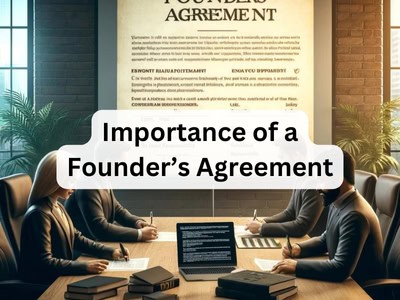This post is also available in:
简体中文 (Chinese (Simplified))
Importance of a Founder’s Agreement – Safeguarding Interests
 An Essential Document That States Everything as Clear as Crystal for the Business
An Essential Document That States Everything as Clear as Crystal for the Business
What is more thrilling than commencing a business that you and your friends or investors are passionate about? Well, what about a founder’s agreement? It is a document that provides a safety net for all of the founders.
The Crucial Talk
Often a company starts with you and only you since you came up with the brilliant business idea. But soon you may need a partner or partners that can help kick off the business model or work on a particular area you are not familiar with. Hence, sit with all of your business founders and have that talk. It is the talk that saves everyone’s time and money if the worst were to happen to the company. The outcome of the conversation will be a founder’s agreement, where everyone agrees to conditions discussed and set it in ink. The agreement will usually consist of a percentage of shares, voting rights, rights to intellectual property, vesting schedule and conditions of entry or exit of the business.
The Big Why
This vital document is vital for future protection of every founder’s needs and interests if the worst happens for whatever reason. Maybe you think, the business is still too young to have an idea of what can happen, but who starts a business without understanding the challenges ahead? You and your partner would have thought things through for the benefit of the business, but what about the founder’s time, money, effort and interests? If the company has its insurance, so should the founders. By law, this document is optional, but by common sense, it is necessary. When you have a founder’s agreement completed and incorporated in your other legal documents, it also shows potential investors that you mean real business.
The Essence of a Founder’s Agreement
Now, we get to the best part. What goes inside a founder’s agreement. The most common way is incorporating it into your company constitution. That way, it is easier to refer to when it concerns business conduct or the founder’s rights and responsibilities. The following are what commonly is in a founder’s agreement:
- Name of every founder and the business: A fundamental and necessary detail.
- Validity length: It outlines how long your or other founders would remain in the company.
- Company goals: This gives an overview of how the company works and operates.
- Rights and Responsibilities: Every founder would be an expert in an area of the business. Ink it down, so everyone knows.
- Shares and equity breakdown: When it comes to money, never assume. Pen it down, at least you and partners agree on it the earliest possible.
- Vesting: This is crucial if you want everyone to be on board and work it out to a profitable phase. Come up with a vesting schedule so that everyone is aware of when they can get their hands on their shares.
- Intellectual property: As long as everyone is still working for the company, all ideas belong to the company. Even if one of the founders came up with an idea during their holiday trip.
- Salary & Compensation: Writing this down early on makes it easy for the company to pay up when needed.
- Exit provision: You and your partners may have agreed to be in this venture through and through. But, still providing this option is vital because no one can predict the future, but can hopefully prepare for the worst.


 An Essential Document That States Everything as Clear as Crystal for the Business
An Essential Document That States Everything as Clear as Crystal for the Business
